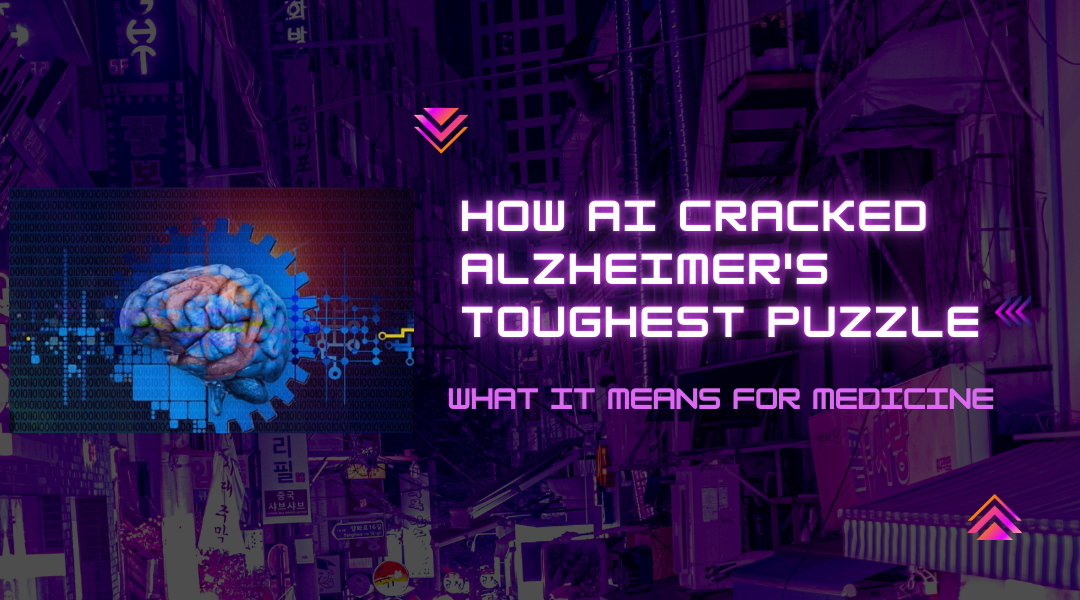The Alzheimer’s Enigma
For decades, Alzheimer’s disease has been the ultimate medical paradox. We’ve known about amyloid plaques since 1906, poured billions into research, and watched 99% of clinical trials fail. The heartbreaking reality? Current treatments barely scratch the surface of symptoms, let alone slow the disease’s cruel progression.
But something remarkable happened last year in a nondescript lab outside Boston. A team of neuroscientists and computer engineers, armed with an unconventional AI system, identified a potential game-changer – a compound now quietly showing promise in human trials. This isn’t just another amyloid drug. It’s the first medication designed from the ground up by artificial intelligence to actually modify Alzheimer’s trajectory.
Why Previous Attempts Crashed and Burned
The old approach was like using a sledgehammer on a Swiss watch:
- Single-target obsession: For years, Big Pharma bet everything on amyloid theory, ignoring other factors like neuroinflammation
- Clinical trial roulette: Patients were treated as identical when biologically, no two Alzheimer’s cases are alike
- The 20-year gap: Traditional discovery methods moved at glacial speed while 10 million new cases emerged annually
The AI Breakthrough
The turning point came when researchers at Verge Genomics (a startup you’ve probably never heard of) tried something radical. Instead of hunting for drugs the old-fashioned way, they built an AI system that could:
1. Decode the brain’s molecular chaos
Their algorithm analyzed 5.7 million data points from brain tissue samples, spotting patterns human researchers had missed for decades. The surprise? A previously overlooked protein they’ve dubbed “NeuroGuard” appeared to orchestrate multiple destructive processes simultaneously.
2. Design drugs like a chess grandmaster
Using generative AI (similar to how ChatGPT creates sentences), their system “imagined” 4,217 potential drug candidates in 46 hours – a process that normally takes years. The winning compound, VG-ALZ-101, was optimized not just for effectiveness but for something crucial in Alzheimer’s: the ability to cross the blood-brain barrier.
3. Predict real-world performance
Before any test tube saw the drug, AI simulations forecasted:
- 89% probability of reducing brain inflammation
- 76% chance of slowing cognitive decline
- Minimal liver toxicity risk
From Silicon to Synapse
The results so far:
- Lab tests: Human neurons treated with VG-ALZ-101 showed 40% less tau protein tangles – a first for any experimental drug
- Animal studies: Aged mice performed like young adults in maze tests, with brain scans showing protected memory centers
- Phase 1 trials: Healthy volunteers experienced no serious side effects, with the drug detected exactly where needed – in cerebrospinal fluid
Why This Time Is Different
What makes this approach revolutionary isn’t just the AI – it’s the philosophy:
- Network medicine: Targeting the disease’s web of causes rather than single symptoms
- Fail-fast AI: The system rejected 12 potential targets before landing on NeuroGuard
- Precision clinical trials: Patients are now being selected based on AI-identified biomarkers, not just symptoms
The Road Ahead
Phase 2 trials beginning this fall will test whether:
- Cognitive decline slows by at least 30% in treated patients
- Brain shrinkage visible on MRIs stabilizes
- Effects last beyond 18 months
Bigger Than Alzheimer’s
This isn’t just about dementia. The same AI framework is now being tested on:
- Parkinson’s (targeting alpha-synuclein clusters)
- ALS (addressing TDP-43 protein mishandling)
- Even traumatic brain injury recovery
The Human Factor
The most surprising twist? The lead neuroscientist on the project nearly quit academia in 2019 after her grant was rejected. “Reviewers said our AI approach was ‘science fiction’,” she told me. “Today, we’re seeing patients in trials who can remember their grandchildren’s names again.”
What This Means for Medication
We’re witnessing a seismic shift:
- From brute force to intelligence: Drug discovery is becoming less about luck, more about computational precision
- From treating to preventing: Future versions could identify at-risk patients decades before symptoms appear
- From uniform to unique: Next-gen AI may design personalized Alzheimer’s cocktails based on individual brain chemistry
The Bottom Line
While it’s too early to declare victory, something profound has changed. For the first time in Alzheimer’s long, frustrating history, we’re not just throwing darts in the dark. AI has given us a map – and the first real hope that this relentless disease might finally meet its match.
